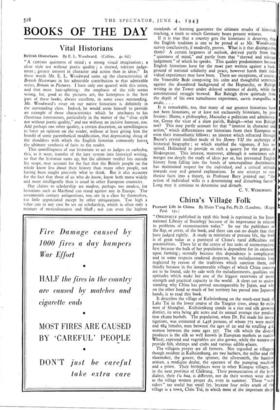BOOKS OF THE DAY
Vital Historians
British Historians. By E. L. Woodward. (Collins. 45. 6d.)
"A CERTAIN quietness of mind ; a strong visual imagination; a clear style not without poetic quality ; a shrewd, tolerant judge- ment ; greater interest in character and action than in ideas." In these words Mr. E. L. Woodward sums up the characteristics of British Historians in his admirable contribution to that admirable series, Britain in Pictures. I have only one quarrel with this series, and that mere hair-splitting : the emphasis of the title seems wrong, for, good as the pictures are, the letterpress is the best part of these books, always excellent, in some cases outstanding. Mr. Woodward's essay on our native historians is definitely in the outstanding class. Indeed, he would seem himself to provide an example of those characteristics which he attributes to his illustrious forerunners, particularly in the matter of the "clear style not without poetic quality," and not without an incisive humour, too. Add perhaps one other quality, a certain discretion, an unwillingness to force an opinion on the reader, without at least giving him the benefit of some parenthetical modification, that deprecating shrug of the shoulders with which the English historian commonly leaves. the ultimate synthesis of facts to the reader.
This unwillingness of our historians to act as judges ex cathedra, this, as it were, transfer of the jury system into historical writing, so that the historian sums up, but the ultimate verdict lies outside his scope, may account for the fact that the British people on the whole know less about their history than many other people, not having been taught precisely what to think. But it also accounts for the fact that those of us who do know, know both more widely and more intelligently than is usual in other European countries.
Our claims to scholarship are modest, perhaps too modest, for historians such as Maitland can stand against any in Europe. The seventeenth century antiquarians, too, are in a class by themselves, too little appreciated except by other antiquarians. Too high a value can in any case be set on scholarship, which is often only a mixture of meticulousness and bluff ; nor can even the highest standards of learning guarantee the ultimate results of historical teaching, a truth to which Germany bears present witness.
If it is true that a country gets the historians it deserves, then the English tradition is one to be proud of as Mr. Woodward% survey conclusively, if modestly, proves. What is it that distinguishes them? A certain largeness of outlook, derived partly from that " quietness of mind," and partly from that " shrewd and tolerant judgement " of which he speaks. This quality predominates because English historians have for the most part written against a back- ground of national solidarity and peace, however harsh their indi- vidual experiences may have been. There are exceptions, of course; the Venerable Bede compasing his calm and thoughtful sentences against the disordered background of the Heptarchy, or Raleigh writing in the Tower under delayed sentence of death, while the constitutional struggle brewed. But Raleigh drew quietude from the depth of his own tumultuous experience, saevis tranquillus us undis. . . .
It is remarkable, too, that many of our greatest historians have not been historians, or at least not exclusively historians, by pro- fession: Hume, a philosopher, Macaulay a politician and administra- tor, Green the vicar of a slum parish, Raleigh—what was Raleigh not? This may partly account for that " interest in character and action," which differentiates our historians from their European or even their transatlantic fellows: an interest which refracted through Bacon's crystal intellect made of his Henry VII the archetype of historical biography ; or which enabled the vigorous, if less in- spired, Holinshed to provide so rich a quarry for the genius of Shakespeare. This interest, moreover, although it sometimes sub- merges too deeply the study of ideas per se, has prevented English history from falling 'into the hands of unscrupulous doctrinaires, has maintained respect for the individual, and a critical attitude towards easy and general explanations. In any attempt to syn- thesise facts into a theory, as Professor Bury pointed out, " the action of individual wills is a determining and disturbing factor." Long may it continue to determine and disturb.
C. V. WEDGWOOD.


























 Previous page
Previous page